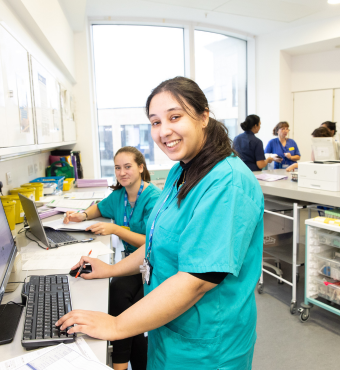
More patients are able to get home more safely thanks to assistive technology, which helps people to live safely at home, avoid hospital admissions and helps to shorten hospital stays.
Technology Enabled Care (TEC) refers to assistive technology and telecare that helps people to live in their homes safely and supports their independence. This includes a range of equipment, from simple gadgets to sophisticated technology. For example: pendants and pagers to alert others immediately if someone needs help; special plugs to prevent baths overflowing or being too hot; clocks and gadgets that act as a reminder to take medication and drinks to prevent someone getting dizzy, dehydrated, or confused; and voice-controlled speakers and screens that let someone control their environment and speak to friends and family.
Bristol, North Somerset and South Gloucestershire Integrated Care Board (BNSSG ICB), Sirona care & health, North Bristol NHS Trust, University Hospitals Bristol and Weston NHS Foundation Trust, and local authority providers have worked together to establish a consistent approach to TEC referrals. When a patient is successfully referred for TEC, it is installed in the place they call home within 48 hours. This streamlined process helps patients get home sooner, where they are likely to recover more quickly, and frees up a hospital bed for someone who needs it. Since introducing the pilot on four wards at the Bristol Royal Infirmary in April 2023, and rolling it out more widely in 2024, over 500 successful referrals for TEC have been made across BNSSG.
Samuel Jeynes, Digital Project Manager at BNSSG ICB, said: “Introducing a consistent process across all trusts and areas across BNSSG has meant that many more people are now benefitting from what has previously been available but not universally accessible. The project has removed barriers and inconsistencies from previous processes, making it easier for staff to enable successful TEC referrals.”
Cathy Daffada, Associate Director for Integrated Discharge at North Bristol NHS Trust, said: “Since rolling this pilot out at Southmead Hospital in Autumn 2024, we have made around 100 successful referrals for TEC. I am delighted to see this initiative is already benefiting so many patients, helping people get home sooner and enabling faster recovery in the community.”
Using TEC – either on its own or as part of a wider package of care – has been shown to support people to live independently for longer within their own communities. Helping get patients home when they no longer need hospital care not only frees up capacity for hospitals to provide care to those who need it most, but in most cases also helps patients to recover more quickly.
Kathleen James, Clinical Specialist Occupational Therapist for Care of the Elderly and Frailty, shares how TEC is benefiting patients. She said: “The TEC project has increased staff's knowledge and awareness to the many benefits that TEC offers with supporting our patients home, where we know they recover best. We now have a streamlined referral process in which staff, patients and their relatives have increased confidence that they can be helped to live independently at home and are supported to leave hospital."
Sirona care & health’s Assistive Technology Service receives all the referrals across BNSSG. The team then visits people who have been referred to discuss and install the technology which will support them on their return home from hospital.
Shania Uzzell, Assistive Technology Service Lead for Sirona, said: “We have seen firsthand how the technology can benefit individuals by increasing their safety and confidence in being at home. It also provides comfort to families knowing they can call for help if they need it.
“We also provide awareness sessions within hospitals so staff know about the technology and how it can support people to return home sooner. We hope more and more people will be referred into the service so they can live independently in their home for longer.”
In the community, the BNSSG GP federation One Care is working on behalf of general practice, and in partnership with the ICB, to continue to examine other areas of improvement relating to TEC. It started this year with continuing healthcare (CHC), looking to improve how people in receipt of CHC can be better supported using technology, starting with their needs. The lessons learned from this work will be used in partnership with the ICB to develop a better understanding of how TEC can continue to be used more widely and proactively across BNSSG.
